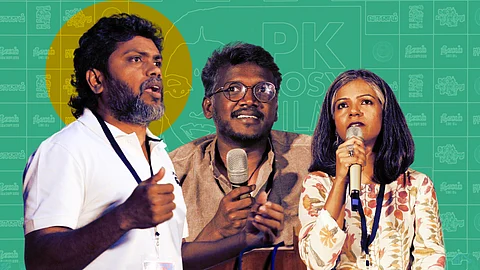
- Reviews
- Power List 2024
- Cannes 2024
- In-Depth Stories
- Web Stories
- News
- FC Lists
- Interviews
- Features
- FC SpecialsFC Specials

On Day 2 of the three-day PK Rosy Film Festival, I managed to catch the recently-released Telugu film Ambajipeta Marriage Band (AMB) at the Prasad Films Lab in Chennai. The theatre was jam-packed – with few people even seated on the floor. The film is available for streaming (on Aha Telugu) and so are all other films and most documentaries screened at the film festival. But the crowd at the festival only kept growing in numbers. Vasugi Bhaskar, editor of Neelam publications, whose documentary Melpathi was screened at the festival, says, “We wanted to show the parallel narrative that exists alongside the grand narrative in society in all art forms. Our core theme is ‘social justice and culture through the eyes of Dalits.’”
Organised by Pa Ranjith’s Neelam Panpattu Maiam (Neelam Cultural Centre), Vaanam which started as a three-day fest in 2018 is today a month-long cultural celebration of the Dalit history month. The PK Rosy Film Festival, named after PK Rosy, the first Dalit actress, is a part of Vaanam. “Everybody is equal under the sky, that’s why we call the fest Vaanam,” Bala Gurunadham, Pa Ranjith’s assistant director tells us. “PK Rosy, a Malayalee, became the first Dalit woman to act in Indian cinema but when her film was out, there was a huge backlash. People even chased her and hit her with stones. She fled to Tamil Nadu but had to hide her identity for the rest of her life. So it’s only fitting to have her name.”
As you walk into Prasad Film Lab to attend the fest, apart from the PK Rosy banner and Neelam book stall, a statue of Ambedkar holding the Annihilation of Caste book too welcomes you. The statue also features intricate carvings of him drinking water, depicting his Mahad Satyagraha movement (1927), a non-violent march to allow everyone to use water from a public tank in Mahad (a place in Maharashtra).
Along with AMB, Tamil movies Maamannan, Viduthalai - Part 1, Blue Star, Malayalam movie Adrishya Jalakangal and English features Ryan Coogler’s Fruitvale Station and Spike Lee’s Blakklansman were screened in the festival. Short film Juice (Hindi) and five documentaries – Chaityabhumi (Hindi), Beyond Hatred & Power, We Keep Singing (Malayalam), Mel Paathi (Tamil), Dr Ambedkar Now and Then (Hindi) and Writing With Fire (Hindi) were also part of the lineup. Apart from these, there were also three-panel discussions on social dramas, modern cinema and Dalit cinema.
“The way the audience engages with the material here is very unlike viewers in other places. The conversations are very critical and the engagement feels personal,” says Jyoti Nisha, whose documentary Dr Ambedkar Now and Then was screened at the festival.
The anti-caste wave in Tamil cinema is quite a unique phenomenon. Nisha says, “In Chennai and Tamil Nadu, in general, the conversations with caste politics and political issues are very relevant and in tune with the time. Whatever Pa Ranjith is doing here is extremely assertive. Such movements are there in a few places but the difference is that here, everyone is very vocal about it. Pa Ranjith has created a new space, a new grammar here.”
Pa Ranjith acknowledges in the panel discussion “Dalit Cinema” (also featuring directors Dr Biju and S Jayakumar) that making such films comes with its own pressures. To call it Dalit Cinema or not, to portray violence or not, to have an outsider lens or not….is something that’s always part of the conversation.
“How do we choose the stories we tell? Don’t we have other issues like climate change, exploitation and class issues? We can also talk about our urban life, family life and relationships.” As a producer, Ranjith thinks the industry is often telling similar stories through many points of view. “Besides social drama, action and love, we don’t have a lot of thrillers or horror stories like Get Out. I think it’s very important to think like that. There are so many stories that are still left unsaid.”
The history of Dalits needs to be told, the director says. “There is a history that Ambedkar created, and there is a history that is spoken about in social circles. So we want to remember such histories and retell those that were concealed.” Entry to the festival is free and it’s because Ranjith believes the ticketing system creates a certain limitation. “I want everyone curious to come and watch. We have rented out a big space, provided free entry and food and have invited several artists from the industry. So we are actually doing it on a substantial budget. Probably, if few people come forward to support the fest, we can make it much bigger.”
The films screened at the festival are mostly those that have already gotten their theatrical or OTT release. Ranjith says, “When we show films that have generated some impact among our social circles, it will create a certain discussion. Idhellam indha karutha otti vandha padangal nu innum namma aani thanama solrom.” That said, the director plans to make the three-day film festival a seven-day celebration from next year, hoping it will give more space for several kinds of films.
The screening of Rintu Thomas and Sushmit Ghosh’s Writing With Fire (2021) was received with excited claps at the fest. The double Sundance winner and Academy Award-nominated is about a group of Dalit women who run Khabar Lahariya, a digital and print news organisation. It explores their issues but also delves into their personal lives, their business trips, newsroom discussions and more. “When we say Dalit cinema, we look at it as something inclusive of everyone. So we wanted to consciously have women directors and their work as a part of the film festival,” says Pa Ranjith.